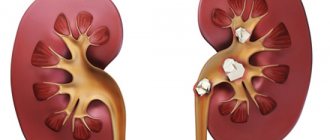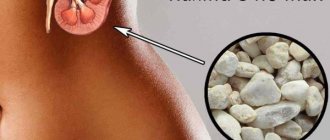The healing properties of rose hips were discovered by people back in the 17th century. But in those days, no one knew that it was good to treat diseases not only with the fruits, but also with the roots of this wild thorny bush with fragrant flowers. Nowadays, it has been established that patients suffering from kidney stones can successfully get rid of stones with the help of young shoots of rosehip rhizome. In these parts of the plant, beneficial substances accumulate most actively, and the loss of small roots does not cause significant harm to the bush.
- 2 Recipes for preparing healing potions
2.1 Decoctions: folk recipes2.1.1 Video: preparing a decoction of rosehip roots and its properties
- 2.2.1 Photo gallery: plants included in the collection for dissolving stones
Decoction recipes
There are several ways to prepare decoctions and infusions, and depending on the method, the proportions of active ingredients vary. Sometimes additional components are added to strengthen the Rosehip roots.
Decoction recipe:
- 200 grams of dried rhizome.
- 1500 ml boiled water.
Bring to a boil, reduce temperature, and brew until a little more than half remains, about 800 ml. Take 200 ml 30 minutes before meals. This amount is designed for one day, due to the fact that the decoction quickly loses its beneficial properties. The next day you should prepare a fresh drink. Use for 10–14 days, after which take a break for a month. Increasing the dosage or duration of treatment may cause negative reactions from the kidneys or liver, as well as allergies.
For one serving of decoction you need:
- 30 grams of roots.
- 1 glass of water.
Dissolve the roots in water and bring to a boil, wait 1-2 minutes, then let it brew for 1-2 hours. Take in the same way as in the previous case - before meals, and no more than 2 weeks.
If discomfort occurs after 1-2 doses, the dosage should be reduced by half. If the discomfort does not go away, stop using the decoction and consult a doctor. Perhaps there are diseases that interfere with the normal functioning of the kidneys, or Rosehip has a negative effect on other organs.
Rosehip recipes for kidney stones and sand
For kidney stones, comprehensive treatment is necessary if necessary:
- remove stones;
- strengthen the immune system;
- improve the functioning of the genitourinary system;
- eliminate the risk of recurrent disease.
Therefore, it is very important to follow the rules and recommendations of the attending physician, so as not to aggravate, but to correct the situation. You can brew rosehip infusion at any time of the year. It nourishes the body with essential elements, especially ascorbic acid. During a flu epidemic, it can strengthen the immune system and resist viruses. For kidney stones, rosehip oil is used, which has a diuretic and choleretic effect, and also accelerates regeneration. Roots, berries, flowers, seeds and foliage are used for therapy.
Eating berries
Urolithiasis is susceptible to the fruits of the plant. You can pick the berries yourself in early autumn or purchase them at the pharmacy. The recipe for making medicine is simple:
Healing decoctions can be made from rose hips for urolithiasis and sand in the kidneys.
- The berries must be cleared of seeds and ground using a blender. Next take 2 glasses of water and 1 tbsp. l. prepared powder, pour into a container and boil for 15 minutes. You need to decant the broth, wait, and let it cool. Drink a few sips before eating.
- 2 tbsp. l. Chop the fruits, pour in 1 cup of boiling water and brew for about 20 minutes. When it cools down, drink half a glass twice a day for 2 weeks.
- 2-4 tbsp. l. Pour 500 ml of boiling water over large berries and leave for 12 hours in a thermos or other container. Use after meals three times a day. Honey and rosehip syrup can be added to tea. It copes well with sand and immediately removes it from the kidneys.
Healing roots
At the end of autumn it is possible to harvest rosehip roots. Rosehip root for kidney stones is used in the form of a decoction. To prepare the drink, you need to take a glass of boiled water and a couple of tablespoons of pre-ground dry roots. Leave for 2 hours. The drink must be taken three times a day. This infusion is taken in a course of 10 days. During the specified period, the stones dissolve and come out. To remove sand, use only one spoon of root.
Seeds and leaves
In folk practices, not only rosehip roots are used to treat kidney stones, but also foliage and seeds. Healing drinks are prepared from them:
- For 1 liter of boiled water, take 100 g of leaves, which are pre-crushed. This drink needs to be infused overnight and drunk all within 24 hours. This drink has a destructive effect on stones.
- Infusions from fresh leaves have a general strengthening effect, which is necessary for urolithiasis. Pour 1 tsp. crushed seeds 200 ml boiled water. The resulting mixture is poured into a container and boiled for 15 minutes. Infuse the drink until it acquires a dark color. Use a third of a glass three times a day before meals.
Contraindications
Due to the large number of substances that make up the Rosehip rhizome, there are a number of situations in which it cannot be used. Diseases that prevent the use of Rosehip root for stones:
- Exacerbations of gastritis and peptic ulcers - due to the high content of vitamin C and pectins, these diseases accelerate their destructive effects.
- Blood clots or a predisposition to them, due to an increase in the number of red blood cells, the disease begins to progress.
- Cardiovascular diseases, hypertension, arrhythmia, violation of the integrity of blood vessels. Due to the effect of substances on blood formation, subcutaneous hematomas, problems with the heart or other organs involved in blood production may occur.
- Excessive consumption causes problems with the liver, causing it to release large amounts of bilirubin into the blood, which turns the skin and whites of the eyes yellow or orange.
- Dermatological diseases most often arise due to errors in the functioning of internal organs, so stimulating effects can aggravate both skin manifestations and the underlying disease.
If these contraindications or their symptoms are present, any components of Rosehip can be used only as prescribed by the attending physician, after undergoing a comprehensive examination.
Beneficial features
Rosehip has two names. In addition to the main one - wild rose. This is due to the fact that during the flowering period the plant is similar in appearance and delicate aroma to a garden rose. The amount of vitamins and beneficial properties of rose hips is amazing:
- retinol – known for its positive effect on vision function, prevents the development of cancer cells, and participates in the functioning of the body’s immune system;
- thiamine – promotes the normal functioning of the nervous system, participates in the metabolic process, transports carbohydrates to cells;
- riboflavin – the main task is to ensure the normal functioning of the thyroid gland and human reproductive organs;
- niacin – normalizes metabolism;
- ascorbic acid – strengthens blood vessels, increases their elasticity, counteracts cancer and improves the function of iron absorption;
- tocopherol – is responsible for the regenerative function of the skin, promotes normal blood circulation.
Only 100 grams of fresh rose hips contain the daily requirement of ascorbic acid, and after drying, the vitamin content doubles.
The rhizome of the shrub is used for medicinal purposes no less than its fruits due to its powerful anti-inflammatory and bactericidal effects. Cystitis, gastrointestinal disorders, urolithiasis - this is not a complete list of diseases for which rosehip roots are excellent in curing.
Features of application
Rosehip rhizome must be used regularly, following certain courses. Most often, it is recommended to use the infusion 3-4 times a day, for 7-10 days. After which there is a break for a month. This cycle is repeated 2-3 times, after which the medicine is forgotten for six months. In order for Rosehip to help, it is necessary to approach recovery systematically, and in the presence of illness, carry out such measures for at least 3-4 years.
If Rosehip is used for preventive purposes, then it is taken 3 times a day, for no more than 7 days. The course can be repeated 2-3 times a year, with breaks of 3-4 months.
Instructions for use
Rosehip root for kidney stones is sold in two forms. In the pharmacy it can be found in packages of 50 grams. You do not need a doctor's prescription to purchase it. Hand-dried plants are sold at the market.
The rules for independently collecting rosehip parts are very specific. They are necessary in order to obtain the maximum amount of nutrients and microelements from the plant.
These include:
- The best time to collect root is autumn. In this case, you should focus on the color of the leaves of the plant. They are endowed with a brownish tint.
- It is necessary to collect rose hips far from civilization. Contaminated plants will not have strong medicinal properties.
- Existing roots must be thoroughly chopped and dried. This must be done either in the oven or on the windowsill.
The recipe for using rose hips is as follows:
- Two tablespoons of dried root should be poured into one glass of warm water.
- After this, the solution is placed on a gas stove and brought to a boil.
- Next, the broth must be removed and left to infuse for several hours.
- After this, the drug is carefully filtered using gauze and becomes ready for use.
When taking the decoction you need to follow some rules:
- The infusion should be taken before eating, three times a day, 100 ml.
- You should drink only freshly prepared remedy, since over time it loses its healing effect.
- It is advisable to take the infusion through a straw. This is necessary to reduce the adverse effects of ascorbic acid on tooth enamel.
- The duration of the course is one week. After this you need to take a break.
Only the attending physician can prescribe the drug and its dosage. This is necessary so that the patient does not harm his health during self-medication.
Concomitant therapy
A decoction of Rosehip root may be accompanied by brewing other herbs that affect the kidneys, such as Knotweed and Horsetail. This decoction also enhances drug treatment, so you should warn your nephrologist or therapist about all medications you are taking.
You can also use Wild Rose for baths, which helps with swelling that occurs due to improper functioning of the kidneys. But baths can be done only at the final stages of treatment, so as not to overload the organs with the influx of fluid.
Brewing Rosehip root to treat and prevent the formation of sand and kidney stones is the best option provided by traditional medicine. This method has been tested by many generations who use the plant to heal and cleanse the entire body.
Benefits and medicinal properties of rose hip root
Rosehip root is a unique product and a real gift for human health. Almost all parts of the plant, especially the rhizome, have beneficial properties for the body. Therefore, all kinds of decoctions and other products based on it have found their use not only in folk, but also in traditional medicine.
Did you know? In Rus', during the time of Ivan the Terrible, rosehip leaves and roots were equal in value to precious stones and sable fur. Their collection was carried out only by a special commissioner appointed personally by the king.
Such products can stabilize the functioning of the excretory, digestive, and reproductive systems. Periodic consumption of just 1 cup of hot broth per day makes it possible to stimulate the immune system and also helps eliminate pathogenic flora from the intestines and other systems.
Medicines from rosehip root are also used for various disorders of cardiovascular activity, for diuretic, choleretic and restorative effects, and also as the best means for accelerating metabolism.
- All this makes it possible to use the root for treatment:
- immunodeficiency states;
- general weakness caused by the recovery period after a long illness or surgery;
- decreased hemoglobin levels, low blood clotting and hypertension;
- violations of the secretory function of individual systems;
- pathologies and infectious diseases of the intestine;
- diseases of the urinary and biliary system;
- prostatitis, as well as infectious lesions of the prostate;
- general and local inflammatory processes, including arthrosis;
- metabolic disorders and associated pathologies.
Important! Any medicinal therapy based on rose hips must be agreed with doctors.
Otherwise, there is a high probability of aggravation of the main ailment, as well as the addition of additional disorders to it.
Use of Rosehip root for kidney stones
Often, nephrologists who examine the patient’s kidneys and do not want to prescribe many drugs that affect the liver turn to traditional medicine and herbal medicine. Works on the benefits of Rosehip were written back in the 17th century. In the presence of urolithiasis, it is not the main root tap that is used, but young shoots, which contain the highest concentration of active substances, and their loss does not cause significant harm to the plant.
Rosehip root is sold in pharmacies both separately and as part of herbal tea, but if you want to prepare the raw materials yourself, you must follow the rules.
How to get dry root step by step:
Rosehip root
- In early spring, before the sap begins to flow in the plant, the bush is dug up on one side and the side stem is cut off. Small shoots are removed from it.
- The blanks are washed, cut into pieces with a diameter of 2–3 cm, and then dried under a canopy. It is important to ensure that fungal infections and insects do not appear. Depending on the ambient temperature, this takes 30–60 days.
- You can store the finished roots for 2 years, in canvas bags or airtight jars. Useful properties gradually decrease with the obsolescence of raw materials.
It is quite difficult to monitor the correct preparation, and therefore pathogenic infections of raw materials are possible, which will lead to a decrease in beneficial properties. And it may also lead to allergic reactions. But these are rare phenomena; most often, the loss of healing qualities occurs due to disturbances during drying. To avoid these difficulties, it is better to buy ready-to-use Rosehip root, the professional processing of which has made it possible to preserve the maximum amount of healing substances.
Where to get raw materials
You can buy rosehip root at a pharmacy kiosk. A pack of ready-made product costs up to one hundred rubles. Another option is to buy from herbalists at the market. The cost of such a product can be both higher and lower than the pharmacy version, but no one guarantees the quality.
Pharmacy
In order not to worry about the environmental friendliness of the future medicine, you can prepare the raw materials yourself, especially since it is not at all difficult. To get a complete product, listen to the recommendations of experts:
- The root is best harvested in the fall, when the leaves are touched by autumn pigment;
- You cannot take plants that grow along roads or within the city, as the rhizome accumulates all the negative substances;
- It is best to collect raw materials from plants growing at higher elevations;
- The roots need to be thoroughly washed, crushed and dried; this can be done in a well-ventilated space under natural conditions or in an oven at low temperature.
Useful components of rose hips
The fruits of the medicinal plant are rich in:
- Minerals (iron, calcium, potassium, phosphorus, manganese, magnesium, zinc, copper).
- Vitamins (C, PP, K, E). Rosehip is the record holder for the content of ascorbic acid, which the body cannot produce on its own.
- Riboflavin (maintains normal thyroid function, improves immune function).
- Thiamine (required for the development and growth of the body).
- Carotene (produces an antioxidant effect).
- Malic and citric acids.
- Folic acid (necessary for normal digestive processes).
- Tannins (minimize the damage caused to cells by carcinogens, prevent gastrointestinal inflammation).
- Essential oils.
- Phytoncides that produce an antimicrobial effect.
Berry decoction is used to cleanse the kidneys and improve the functioning of the bile ducts, liver, improve immunity, and improve intellectual endurance.
As part of therapeutic procedures, rose hips are used, as well as the bark, seeds, petals, branches and roots of the plant. An infusion of dry roots is characterized by a diuretic, antiseptic, analgesic, and anticonvulsant effect. When consumed, the flexibility of the ducts through which urine is transported increases, the processes of splitting, softening of stones, and resorption of sand formed in the organs of the urinary system are accelerated.
In addition to the treatment of kidney diseases, kidney stones, the use of rose hips improves the condition of patients with atherosclerosis, anemia, cystitis, pneumonia, and pyelonephritis.
Contraindications and precautions
It is recommended to use rosehip for kidney treatment only after consulting a doctor. This is due to the fact that during the treatment, large stones may begin to pass away, thereby blocking the ureter, the passage of urine will be difficult, and surgical intervention will be required. Rosehip does not dissolve certain types of stones, in which case this remedy will be contraindicated due to its ineffectiveness and danger.
There are a number of conditions for the use of herbal medicine:
- Storage is permissible only in the refrigerator for no more than 2 days. It is best to brew for one day, during which the liquid is drunk.
- The occurrence of side effects (nausea, dizziness) after starting the course indicates that it is necessary to reduce the daily intake of rose hips.
- After completing the course of treatment, stop using decoctions for 30 days.
Rosehip, despite its benefits, has a number of contraindications:
- advanced stage of renal failure;
- increased stomach acidity;
- ulcer, gastritis;
- endocarditis;
- thrombosis, thrombophlebitis;
- osteoporosis;
- bile stagnation;
- pregnancy;
- severe liver disease;
- prolonged constipation.
Not all herbal remedies complement each other during use. Therefore, when using other medicinal herbs, joint use should be agreed with a doctor. For the beneficial effect of rose hips on the urinary system, it is better to use the roots and fruits; these are the parts of the bush that will be most effective. The kidneys will be cleansed, and the body as a whole will receive a full range of vitamins to strengthen the immune system.
Causes of kidney stones
Salt compounds that are part of urine in dissolved form do not pose a threat to health; they can be eliminated from the body by special mechanisms. If salts pass into solid form (crystallization), the process of removing them becomes difficult. Stones (calculi) are formed from particles that cannot dissolve in urine, and urolithiasis progresses.
The formation of kidney stones is caused by:
- Destabilization of metabolic processes.
- Non-compliance with nutritional principles (abuse of salty foods, calcium-rich foods).
- Lack of vitamins A, B6.
- Severe forms of infectious and inflammatory processes.
- Liver diseases.
- Bad habits.
- Leading a sedentary lifestyle.
To relieve painful symptoms, normalize well-being and eliminate disturbances in the functioning of the kidneys, drug therapy, stone crushing methods, surgical operations, and herbal medicine are used.
An effective way to restore and maintain normal kidney function is rosehip therapy.










